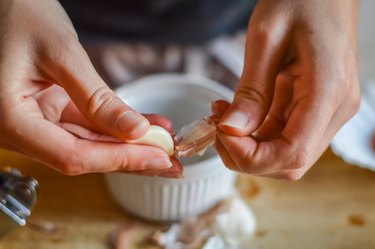
If your jaw makes a symphony of sounds every time you move your mouth, you might be wondering whether to be concerned. While occasional jaw popping or clicking is NBD, more consistent noise whenever you chew, talk or yawn can indicate a bigger jaw issue.
Here, Marina Gonchar, DMD, board-certified orthodontist and founder of Skin to Smile, explains why you might be dealing with a clicking or popping jaw, plus what you can do to manage (or prevent) the problem.
Video of the Day
Video of the Day
1. You Have Temporomandibular Joint Dysfunction
A jaw that constantly clicks could be due to a problem with your temporomandibular joint (TMJ), a joint located between your lower jawbone and skull that facilitates lower jaw movement, Dr. Gonchar says.
"Temporomandibular joint dysfunction [TMD or TMJ disorder] is a broad term to encompass all joint dysfunction and can have a variety of causes," she says.
Some of the most common causes include:
- Trauma
- An improper bite
- Osteoarthritis
- Osteomyelitis (inflammation or swelling in the bone)
- Muscle dysfunction
- Nerve dysfunction
In addition to jaw popping and clicking, you may also experience some of these telltale signs of TMD, per the Mayo Clinic:
- Pain or tenderness of your jaw
- Pain in one or both of the temporomandibular joints (you have one on each side of your jaw, so jaw clicking on one side may mean only one of the joints is affected)
- Aching pain in and around your ear
- Difficulty chewing or pain while chewing
- Aching facial pain
- Locking of the joint, making it difficult to open or close your mouth
Fix it: To stop the jaw popping and pain that come with TMJ disorders, you and your dentist will need to get to the root of what's causing it, Dr. Gonchar says. The solution “can be as simple as a dental splint [i.e., a specially designed mouth guard] or as complicated as a full surgical joint replacement,” she adds.
2. You Have Arthritis
When you think arthritis, body parts like creaky knees or stiff fingers probably come to mind. But arthritis can affect any of your joints, including those in your jaw.
"Arthritis is a condition that results in joint inflammation and over time can result in degradation of the bones in the jaw joint," Dr. Gonchar says. Indeed, arthritis can damage the jaw joint's cartilage, producing those signature popping and clicking sounds.
Both osteoarthritis (known as "wear-and-tear" arthritis) and rheumatoid arthritis (an autoimmune condition that attacks the joints) can occur in the jaw joint, according to Johns Hopkins Medicine.
On top of jaw popping, other symptoms may include pain, swelling and restricted movement of the jaw joint.
Fix it: Arthritis is a degenerative disease that can become progressively worse and fairly difficult to treat, Dr. Gonchar says. Still, you have options to stop the constant jaw clicking.
“Possible treatments include anti-inflammatory systemic medications as well as local steroid injections to reduce joint inflammation and bony breakdown,” Dr. Gonchar says.
If you suspect arthritis is behind your cracking jaw, talk to your doctor or dentist about the best treatment course for you.
3. You Have an Improper Bite
Bite issues can also instigate jaw popping. Your "bite" involves how your upper and lower teeth meet. When they don't align correctly (or don't come together at all), you have a "bad bite," also known as malocclusion, according to the American Association of Orthodontics (AAO).
"Bite issues can result in joint dysfunction due to the improper relationship of the upper and lower jaw," Dr. Gonchar says. Think of it like this: When the teeth don't fit properly, it puts stress on the jaw joints.
Overbite (when the upper front teeth extend too far out over the lower front teeth) and underbite (when the lower jaw sits in front of the upper jaw) are just two types of bite problems that can bring on jaw popping.
Fix it: Left unchecked, bite problems can worsen over time, per the AAO. That’s why it’s best “to seek orthodontic treatment in cases like this to treat the underlying bite issues,” Dr. Gonchar says.
By creating a healthy bite through treatment, you “can significantly alleviate any joint problems and prevent further breakdown,” she says.
4. You’re Grinding Your Teeth
"Consistent clenching and grinding can result in jaw popping and clicking," Dr. Gonchar says.
Called bruxism, this bothersome behavior often happens at night while you're sleeping. And it can be bad news for your jaw joints.
Here's why: When you grind or clench, there's a constant contraction of your jaw muscles, which can place excessive strain on your TMJ, according to the Cleveland Clinic: And this prolonged pressure on your jaw is what produces the popping and clicking.
On top of a noisy jaw, other signs of grinding include, per the Cleveland Clinic:
- Grinding or clenching loud enough to wake your sleep partner
- Flattened, fractured, chipped or loose teeth
- Worn tooth enamel, exposing deeper layers
- Increased tooth sensitivity
- Jaw or face pain and soreness
- Tired, tight jaw muscles
- Earache-like pain in your head or face
- Dull headaches beginning at the temples
- Indentations/scalloping on the sides of your tongue
Fix it: “Most of the time [this grinding issue] can be relieved with minimal intervention, such as a dental splint, but will require a visit to the dentist,” Dr. Gonchar says.
Often a specially made night guard can help nip bruxism in the bud. These custom-fitted orthotic devices create a stable bite to curtail contraction of jaw muscles and, consequently, slash stress on the jaw joint, according to the Cleveland Clinic.
Once your jaw is in healthy alignment, your popping should peter out.
You can also try these additional tips to combat clenching and grinding, per the Cleveland Clinic:
- Cut back on caffeine, especially before bed
- Avoid alcohol and smoking
- Don’t chew on pens, pencils or other things that aren’t food
- Don’t chew gum daily (it can make existing pain worse)
- Avoid sleeping on your stomach or placing your hand on your jaw (back-sleeping is best)
5. You Have Sleep Apnea
Sleep apnea may be the source of those jaw-popping sounds. This sleep disorder — which causes abnormal breathing during slumber — often goes hand in hand with the habit of increased clenching and grinding, Dr. Gonchar says. And, as we know, nighttime bruxism can result in clicking and popping of the jaw joint.
Along with jaw popping, other symptoms of sleep apnea to look out for include, per the Mayo Clinic:
- Loud snoring
- Episodes in which you stop breathing during sleep
- Gasping for air during sleep
- Waking up with a dry mouth
- Morning headache
- Difficulty staying asleep (insomnia)
- Excessive daytime sleepiness (hypersomnia)
- Difficulty paying attention while awake
- Irritability
Fix it: “The best course of treatment to alleviate joint discomfort is to address the underlying condition,” Dr. Gonchar says. “Sleep apnea can be treated with a variety of dental appliances, depending on the severity, or even surgical intervention.”
In other words: See your doctor or dentist for sleep apnea treatment.
6. You Have Myofascial Pain Syndrome
The most common type of TMD, myofascial pain syndrome is a debilitating disorder characterized by discomfort or pain in the muscles and fascia (the connective tissue around the muscles) in the jaw, neck and shoulder, according to Johns Hopkins Medicine.
This painful condition occurs when certain muscle fibers become tight and sensitive due to injury or overuse, per the Mayo Clinic.
Not only can muscle strain and excessive use of the jaw joint cause pain, but it can also lead to loud popping and clicking noises, Dr. Gonchar says.
Chronic stress and anxiety may also play a role in myofascial pain syndrome. That's because people dealing with extreme stress may be more prone to clench their muscles, putting repeated tension on these tissues, according to the Mayo Clinic.
Fix it: “To alleviate these symptoms, it is possible to do trigger injections to relieve pain and Botox to reduce muscle use,” Dr. Gonchar says.
What’s more, keeping your stress level in check is also a smart strategy to help manage myofascial pain syndrome. Try these six types of breathing exercises that can help reduce stress.
7. You Have an Injury or Trauma to the Jaw
Trauma to the jaw can trigger the tendency for the TMJ to pop and click.
Unsurprisingly, a severe injury that leads to a jaw fracture can dramatically affect the jaw joints and their proper functioning, Dr. Gonchar says. Case in point: A dislocated jaw, displaced disk or injury to the condyle (the rounded end of the jawbone) can damage the jaw muscles, joints and nerves, resulting in a temporomandibular disorder, according to Johns Hopkins Medicine.
And, as we've learned, TMJ problems are common culprits of jaw clicking and popping.
Fix it: “In cases of fractures, the patient would need to seek surgical care to have the jaws fixated with plates and screws,” Dr. Gonchar says. “If the joint is damaged and results in clicking or popping, interventions such as partial joint replacement or full joint replacement may also be indicated.”
In less severe cases, she says, "it is possible that the jaw can heal on its own without any need for intervention." But you should always seek medical advice for treating this kind of injury.
8. You Have an Infection
Oddly enough, sometimes a seemingly unrelated bout of sickness is responsible for the strange sounds your jaw is making.
"Ear or sinus infections can sometimes manifest as jaw popping or clicking," Dr. Gonchar says. "This is due to pressure changes that can affect the temporomandibular joint," she explains.
Keep in mind, though, it may be a tad tricky to diagnose this issue. At times, "the symptoms can be confused with TMJ dysfunction," Dr. Gonchar says.
So how can you distinguish between traditional TMJ issues and an infection? For one, "the symptoms of this will be transient and only persistent during the illness," Dr. Gonchar says. In other words, once you've recovered, the popping noises will stop.
Plus, look for other common signposts of sickness that wouldn't accompany a TMJ disorder.
For earaches, symptoms include, per the Mayo Clinic:
- Ear pain
- Drainage of fluid from the ear
- Trouble hearing
For sinus infections, you may experience the following, per the Centers for Disease Control and Prevention:
- Runny nose
- Stuffy nose
- Facial pain or pressure
- Headache
- Mucus dripping down the throat (post-nasal drip)
- Sore throat
- Cough
- Bad breath
Fix it: Ear and sinus infections are best diagnosed by an MD who can properly examine, assess and prescribe you the appropriate medication, Dr. Gonchar says.
When to See a Dentist or Doctor About Jaw Popping
"Occasional jaw popping should not be a concern as long as there are no other associated symptoms," Dr. Gonchar says. In other words, if your jaw pops but doesn't hurt or come with other red flags, it's likely no big deal.
However, if your jaw clicking is a frequent occurrence and/or you're unable to fully open or close your mouth, this may indicate a more serious problem that requires diagnosis and possible treatment, she says.
Other indications to see a dentist regarding your jaw joints include, per Dr. Gonchar:
- Persistent jaw pain
- Muscle tenderness in your lower jaw
- Persistent headaches
- Mayo Clinic: “TMJ disorders”
- Johns Hopkins Medicine: “Temporomandibular Disorder (TMD)”
- American Association of Orthodontics: “7 Common Bite Problems in Children and Adults”
- Cleveland Clinic: “Waking Up With a Sore Jaw? You May Be Grinding Your Teeth”
- Mayo Clinic: “Sleep Apnea”
- Mayo Clinic: “Myofascial pain syndrome”
- Mayo Clinic: “Ear infection (middle ear)”
- Centers for Disease Control and Prevention:” Sinus Infection (Sinusitis)”
Is this an emergency? If you are experiencing serious medical symptoms, please see the National Library of Medicine’s list of signs you need emergency medical attention or call 911.


